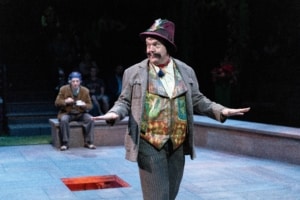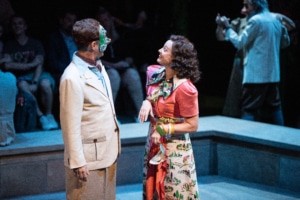DCPA NEWS CENTER
Enjoy the best stories and perspectives from the theatre world today.
Enjoy the best stories and perspectives from the theatre world today.
Modern audiences don’t have the benefit of footnotes when enjoying a Shakespeare play. When reading the text, footnotes are often necessary to comprehend the nuances of Elizabethan age humor, slang, and history. Shakespeare’s Much Ado About Nothing is heralded as one of Shakespeare’s best comedies, containing copious amounts of wordplay and banter. Before attending a performance in the Kilstrom Theatre, get a head start on understanding Much Ado.

Jennifer Paredes in Much Ado About Nothing. Photo by Michael Martin Photography
There’s a common misconception that all Shakespeare’s plays are written in verse, specifically iambic pentameter. If you don’t remember iambic pentameter from your high school English class, just think of Romeo and Juliet: “Two households, both alike in dignity / In fair Verona, where we lay our scene” (Prologue). Ten syllables per line, with a lilting de/DUM de/DUM rhythm.
However, Much Ado About Nothing is written (for the most part) in prose. This means there is no inherent rhythm or meter in the text. Additionally, there are a few segments written in verse, which makes them stand out from the rest of the play. Perhaps most notably is in the wedding scene, where Claudio denounces Hero for supposed infidelity. Claudio, impassioned and angry, is compelled to speak in verse. The rest of the cast follows suit until Benedick and Beatrice are left alone in the church.

Rob Nagle in Much Ado About Nothing. Photo by Michael Martin Photography
In general, it’s important to listen closely to the character Dogberry. The constable commonly uses what are known as malapropisms, where someone mistakenly uses one word in place of another with a humorous result. Due to Much Ado, a malapropism is also sometimes referred to as a “dogberry.” For example, in Act 3 Scene 5, Dogberry confuses the words “wealthy” and “tedious,” claiming if he had a thousand times more “tediousness,” that he would give it all to Leonato.
Find the name Dogberry to be funny? Shakespeare did that on purpose, of course. Dogberry’s character is the chief of the citizen-police in Messina. In Shakespeare’s time, citizen-police were considered highly unqualified and disrespected. The name Dogberry refers to the berries grown from the common dogwood plant, widely believed to be not as tasty as other berries. The name is an allusion to Dogberry’s inferiority and ineptitude.
On the other end of the spectrum, the characters Beatrice and Benedick are heralded as two of Shakespeare’s wittiest. Beatrice’s sharp tongue is meant to be seen as “shrew-ish” in the prejudice of Shakespeare’s time, but without bias, audiences can appreciate her turn of phrase. Her first line in the play is “I pray you, is Signor Mountanto returned from the wars or no?” (I.i.30-31). She is referring to Benedick with this jab; Shakespeare’s audiences would understand “mountanto” as slang for a social climber (or as a sexual innuendo).

Geoffrey Kent and Dana Green in Much Ado About Nothing. Photo by Michael Martin Photography
Another example of Beatrice’s wordplay is her ability to take a metaphor and flip it into something literal. In the same scene, the messenger speaking with Beatrice says, “I see, lady, the gentleman is not in your books [i.e. good favor]” (I.i76-77). Beatrice responds in the literal, saying “No. An he were, I would burn my study [i.e. library]” (I.i.78).
It could take days to cover all of Shakespeare’s work, from his wordplay to the history, but this is a good start for anyone hoping to understand the inner workings of Much Ado About Nothing. Enjoy a performance of Much Ado and see if there is anything else that stands out to you!
DETAILS
Much Ado About Nothing
Sep. 30 – Nov. 6, 2022 · Kilstrom Theatre
Tickets
